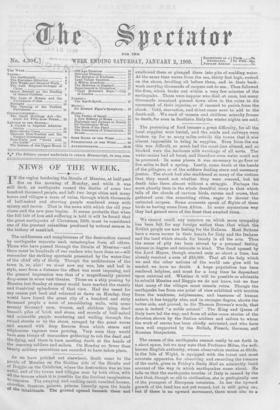. The suddenness and completeness of the destrnction caused by
earthquake separate such catastrophes from all others. Those who have passed through the Straits of Messina—and there must be hundreds of our readers who have done so—will remember the striking spectacle presented by the water-line of the chief city of Sicily. Though the architecture of the town is, or, alas! we must now say was, late and bad in style, seen from a distance the effect was most imposing, and the general impression was that of a magnificently painted drop-scene in some vast theatre. Those on a ship passing by Messina. last Sunday at sunset would have marked the stately and theatrical splendours of that view. Had the vessel for any reason put back and returned at dawn on Monday, they would have found the great city of a hundred and sixty thousand people a mass of smouldering walls, with some seventy thousand men, women, and children lying dead beneath piles of brick and stone, and crowds of half-naked and miserable people wandering and wailing through the ruined streets or by the shore, ravaged by the great waves and seamed with deep fissures from which steam and aulphurous vapours were pouring. Very soon they would have seen troops of marauders gathering to rob the dead and the dying, and these in turn meeting death at the hands of the rescuing soldiers and sailors. On Monday no fewer than twenty military executions are recorded to have taken place.












































 Previous page
Previous page